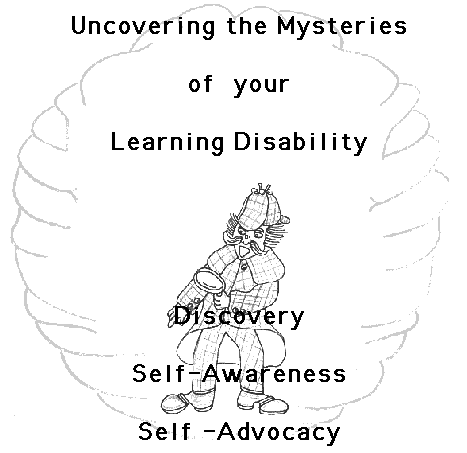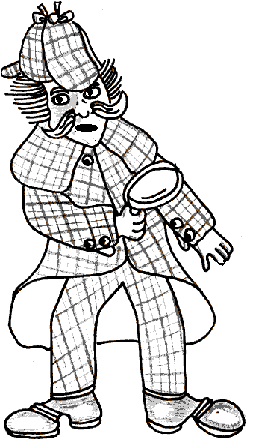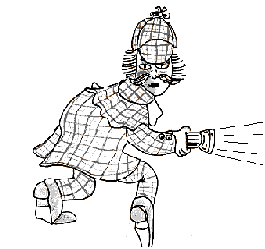Notice: This is copyrighted material.

Written byScott L. Crouse, Ph.D.Illustrations (detective and brain) byKristin N. Crouse (age 10)Copyright © 2009 Scott L. Crouse
Introduction
'Hello. My name is detective Learner. I have been sent by Scotland Yard to help you solve the many mysteries of your learning disability.'
'On this very interesting case we will uncover clues about how your brain works and how you can help yourself learn better.'
'You never know what you might discover on such an intriguing mystery. So keep your eyes and ears open for any possible clues.'
'Follow me . . . . . . . . . . . .'
Chapter 1 - What is a Learning Disability? Famous people with LD
Chapter 2 - What Causes Learning Disabilities? Review Questions
Chapter 3 -Discrepancy = Underachievement Underachievement Worksheet
Chapter 4 -Processing: The Sensory Channels
Chapter 5 - Processing: The Cognitive Channels
Chapter 6 - Processing: Sensory + Cognitive
Chapter 7 - LD Jargon
Chapter 8 -Using Accommodations Know your strengths
Chapter 9 -Other Issues Related to LD Low Self-esteem
Chapter 10 -Intelligence vs IQ Seven Intelligences
Chapter 11 -Exercising Your Weakness Visual Processing Disability
Chapter 12 - LD and the Law Americans With Disabilities Act
Chapter 13 -Becoming an effective Self-Advocate
Chapter 14 -Planning for Your Future High School
Chapter 15 -The Summary
Return to the LDinfo Web Site to find out about any of the following topics (and more): Learning disabilities - what is a learning disability (LD or SLD)? Dyslexia: Dyslexia is a reading disability or reading disorder Dysgraphia Dysgraphia is a writing disability or disorder Dyscalculia Dyscalculia is a math disability or disorder What is an attention deficit disorder (ADD, AD/HD, ADHD)? Gifted LD: Can a student be gifted and LD? Emotional/Behavioral issues and LD: Do LD students experience behavior problems or depression? Section 504: What is a Section 504 plan? What is special education? What is processing? What is a severe discrepancy? What is a nonverbal learning disability (nonverbal LD or NLD)? What is a central auditory processing disorder (CAPD)?
|
Uncovering the Mysteries of your Learning Disability Order printed copies of this manual
|
|
Copyright © 2006-2017 LDinfo Publishing |
|

